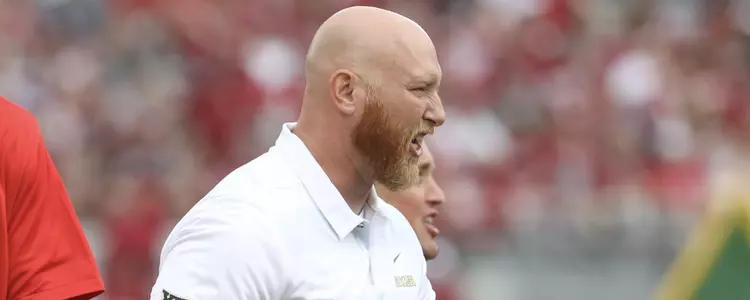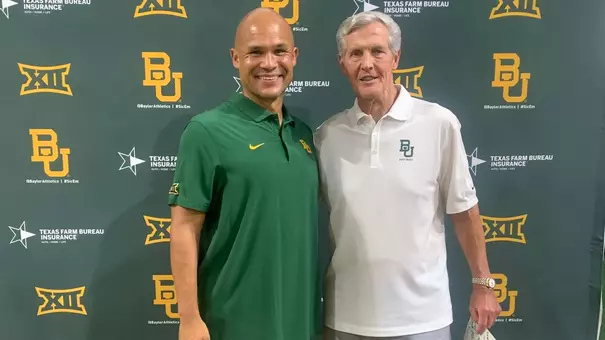
DISCIPLINE, STRUCTURE CAME FROM PENN STATE
7/30/2019 1:32:00 PM | General
Football Strength Coach Believes in ‘Practicing What You Preach’
 By Jerry Hill
By Jerry HillBaylor Bear Insider
Growing up in Wilkes-Barre, Pa., you're passionate about one of two schools – Penn State or Notre Dame.
There was never a doubt about Jeremy Scott's family allegiance.
"I think I went to my first Penn State game when I was 4 years old," he said. "My parents had season tickets, my cousins had season tickets. That's back when Penn State and Notre Dame played each other every year, so that was always a big thing."
Scott, now in his third year as Baylor football's Director of Athletic Performance, admits that he was a little in awe when he took an internship with Penn State's strength and conditioning program fresh out of college in 1996.
"There's guys that I was watching on TV, guys like (quarterback) Wally Richardson, and now I'm working them out," said Scott, who spent 15 years at Penn State, including the last 13 as an assistant coach. "You walk in, and all those guys are there, so sure you are a little in awe. But, you get over that in a hurry because you've got a job to do and you're being held accountable to do things."
More than 20 years later, the lessons he learned at Penn State under head strength coach John Thomas and legendary football coach Joe Paterno still resonate.
"JT came from West Point, and all the things that I have – from the structure and discipline and accountability – I got from him," Scott said. "Joe, too. You're expected to be on time. Ten minutes early, you're already late. All those things came from being around JT and Joe for so many years."
Interestingly enough, the roster that first season at Penn State included a former walk-on linebacker named Matt Rhule.
"His class at the time, and it might still be, the all-time winningest class in Penn State history," Scott said of Rhule, who hired him as the head strength coach at Temple in 2013 and then brought him to Waco four years later. "That was just a bunch of hard-nosed, tough guys. Everything you see now with Coach Rhule and his program, that's how he was back then."
And even as a 20-year-old junior on the football team, there were signs that Rhule was going to be a coach one day, "because he was just one of those cognitive guys that could grasp the playbook," Scott said.
"He would actually help guys like (linebacker) LaVar Arrington and some of these unbelievable athletes, kind of help them on the field. They didn't always understand what was going on, but he did. And you don't just walk on at a place like that and all of a sudden play special teams and get reps at linebacker if you haven't worked hard and put in the time. That's what he did."
You can say the same thing about Jeremy. He comes from a coal-mining region of Northeastern Pennsylvania where his great grandparents worked in the mines "and had some of the donkeys that went down in the mines that were in their back yard."
 "The whole area is just tough, hard-nosed kids, kind of blue-collar," he said. "That's where I got my work ethic from, the discipline of working those hard jobs and all that has really carried over to me, even though I didn't do it. Just growing up and hearing stories from your grandparents about doing those kinds of things."
"The whole area is just tough, hard-nosed kids, kind of blue-collar," he said. "That's where I got my work ethic from, the discipline of working those hard jobs and all that has really carried over to me, even though I didn't do it. Just growing up and hearing stories from your grandparents about doing those kinds of things."After playing football from third grade through high school, Jeremy planned to play at Division II Lock Haven University, "but it didn't work out." Instead, he focused on a love of strength training that actually started in his basement.
"My dad always lifted weights, so we had an old-school set in the basement that was filled with sand," Jeremy said. "I'd go down there, and him and his buddies would be lifting. I'm down there just watching and probably lifting the bar and doing dumb stuff. But, that's kind of where I got my start in liking weight training."
His initial degree plan at Lock Haven was in physical therapy, "but the field was so saturated that it was hard to find jobs." Fitness management seemed like a better fit, anyway, so he got his undergrad degree in kinesiology and then a master's in health education from Penn State in 1999.
At Penn State, one of his passions was training athletes for the NFL Combine. As the Nittany Lions' speed coach, he was responsible for developing players' speed, reaction, agility, quickness and acceleration. Training hundreds of players, one of Jeremy's pupils was defensive end Courtney Brown, the overall No. 1 pick in the 2000 NFL Draft.
"This was before the NFL Combine was an industry. It's absolutely an industry now, a big money-maker," he said. "I would have 16 to 20 guys at Penn State training with me, because there were no other places, except for API in Arizona and Parisi Speed, a place in New Jersey, that were just starting to come up.
"They would be there for two months, and then some guys would go to the actual NFL Combine in Indy, and then they would come back and start training to get ready for camp. That was great, because they got to stick around and were still around their former teammates. I think that's always good when you have former players that are around. Even when guys made it to the NFL, they would come back and train in the summer."
Now, it's part of the "experience," Jeremy said, for guys to go out and work somewhere else to get ready for the Combine or Pro Day workouts. But this past offseason, he got the chance to work with Baylor offensive linemen Blake Blackmar and Patrick Lawrence, "which was nice. It's very rewarding, actually."
Leaving Penn State, Scott spent one year as an assistant strength coach at Princeton before Rhule hired him for the head job at Temple. He saw the Owls go from 2-10 the first year to 6-6 and then back-to-back 10-win seasons, culminating in an American Conference championship in 2016.
 "They were such tough kids, and that's what I really enjoyed in being my first head job and having a bunch of hard-nosed kids that had chips on their shoulder because they weren't highly recruited," Jeremy said. "They worked their tails off and they were just flat-out tough, and it showed on the field."
"They were such tough kids, and that's what I really enjoyed in being my first head job and having a bunch of hard-nosed kids that had chips on their shoulder because they weren't highly recruited," Jeremy said. "They worked their tails off and they were just flat-out tough, and it showed on the field."While Philly was certainly in his comfort zone, Jeremy said he was on board the minute he heard Rhule got the job at Baylor. "I was just hoping he was going to bring me with him," he said.
"We were comfortable at Temple, we were winning," he said. "Then, you come down here and you're out of your comfort zone, which is fine. In this business, if you want to get better, you've got to challenge yourself. That's the only way you get better and grow.
Going back to their days at Penn State, Rhule has a trust level in Scott that "I don't feel like I have to go down to the weight room and micro-manage and see what they're doing," he said.
"I just think he brings a professional approach to the weight room," Rhule said. "It's never about him, it's always about the players. It's always about their health, wellness, safety, and then develop them. I think he does a great job of pushing players to their limits while at the same time always maintaining a safe environment. The biggest thing is he takes tremendous ownership of what happens in the weight room and is willing to listen to new ideas. We're always on the forefront of things that are out there."
In looking at new ideas, Jeremy said you can't have a "We've always done it this way" type of attitude. "If it can help make us better, then why wouldn't we do it?"
Jeremy said he leans on a talented staff that includes Jake Cox, Corey Campbell and former NFL defensive end Rick Lyle.
"Rick comes from the Belichick/Parcells line, which is fantastic hearing those stories," Jeremy said. "As we try to make these guys pro-ready, here's a guy that played in the NFL for those iconic figures and was a strength coach as well. So, that helps."
Similar to the rebuild at Temple, Scott took great joy in seeing Baylor go from 1-11 in Rhule's debut season to 7-6 and a bowl game victory last year.
 "People want to know, 'What did you guys do the summer before the 7-6 year?''' he said. "It wasn't the summer before, it was the 1-11 year when those kids just hung in there. It was really their character and their ability to come back every Sunday and come in here with the frame of mind that they were here to get better and to practice hard and stay with it, even though they weren't seeing results on the field. That's when that 7-6 team was built."
"People want to know, 'What did you guys do the summer before the 7-6 year?''' he said. "It wasn't the summer before, it was the 1-11 year when those kids just hung in there. It was really their character and their ability to come back every Sunday and come in here with the frame of mind that they were here to get better and to practice hard and stay with it, even though they weren't seeing results on the field. That's when that 7-6 team was built."Off the field, Jeremy is married to the former Cory Beth Wickizer, a Penn State graduate herself. They have a 13-year-old daughter, Emma, and 9-year-old son, Evan.
"You're this big tough guy, and your daughter comes running up to you, and it kind of melts your heart, right in front of all the players. And that's OK," Jeremy said.
"The biggest thing that I tell my guys is not only do I try to mentor them in terms of being young strength coaches and growing, but how to be good professional men. When you have kids, you're going to come home from training guys all day long for 10 hours, and then you better be ready to put that dad hat on and go in the backyard for another two hours and throw the football around. Some days, that's hard. But, I love being a dad."
Going back to his mentor at Penn State, Jeremy said he believes in practicing what you preach. If he's not training players or at home being a dad and husband, he's in the gym pushing up weights himself.
"The way I look at it is I can't tell these guys to do this, this and this, and then not be able to do it myself," he said. "If you want these players to respect you, then you better be able to kind of walk the walk with it. That goes back to the way JT, John Thomas, did it at Penn State. That's something that has always stayed with me."
Baylor Baseball: Highlights at Bruce Bolt College Classic | vs. Ole Miss | February 27, 2026
Saturday, February 28
Baylor Basketball (M): Media Availability | February 27, 2026
Friday, February 27
Baylor Basketball (W): Media Availability | February 27, 2026
Thursday, February 26
Baylor Softball: Highlights vs. Sam Houston | February 25, 2026
Thursday, February 26



















